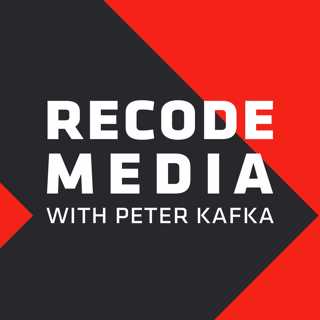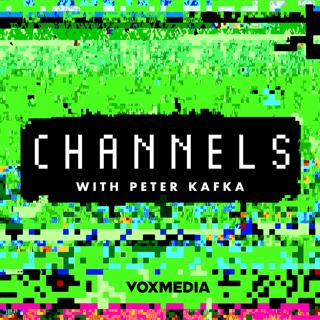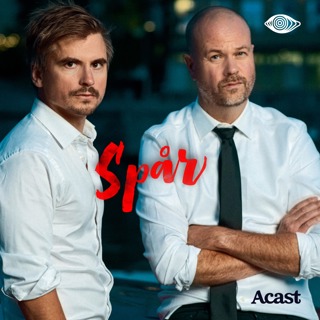
Why podcasts are better than radio (Jad Abumrad, co-host, Radiolab)
Jad Abumrad, the co-host of WNYC Studios' hit show Radiolab, talks with Recode's Peter Kafka about the new season of More Perfect, a spinoff podcast about the Supreme Court. Abumrad says he was getting "restless" a couple years ago at Radiolab, and so dispatched his team to find interesting stories from the judicial system. He also talks about the intense process of making Radiolab — episodes can take a year to report and cost $100,000 — and why, in the heat of the political protests in Charlottesville last month, his team decided to pull down a controversial episode. Plus: The "really weird" way Abumrad was informed he'd won a MacArthur "genius grant," which he initially suspected was a Nigerian email scam. Learn more about your ad choices. Visit podcastchoices.com/adchoices
28 Sep 201736min

When is the internet going to change TV ads? (Dave Morgan, CEO, Simulmedia)
Simulmedia CEO Dave Morgan talks with Recode's Peter Kafka about the future of TV advertising, which has historically been "not so broken that it’s had to be fixed." However, Morgan's company is betting that big advertisers will want their TV ads to start working more like digital ads, personalized to each viewer and able to be connected with buying behavior. He also talks about how his first company, Real Media, weathered the dot-com crash, why the advertising world hasn't changed as quickly as he once predicted and why TV is a much bigger deal than most people in the tech bubble would assume. Plus: A bonus chat with the New York Times' Jim Rutenberg about how Russia used social media to meddle in the U.S. election and what that means for Silicon Valley companies. Learn more about your ad choices. Visit podcastchoices.com/adchoices
21 Sep 20171h 10min

Why Ken Burns won't leave PBS for HBO
Documentarian Ken Burns talks with Recode's Peter Kafka about his new 18-hour documentary, "The Vietnam War." Burns says he sought to upend conventional wisdom about the war by rewinding the iconic images, stories and music of the time and telling history through the lens of all the countries involved in the fighting. He believes we are in a "golden age" of documentaries, but Burns says he has no desire to leave his career-long home, PBS, for a more digital-focused platform like HBO, Netflix or Amazon. He also talks about how war documentaries will change now that no one writes letters anymore, why critics have stopped fretting about the length of his films and why it's okay to watch that cute cat video online — so long as you come back to something more substantial later on. Learn more about your ad choices. Visit podcastchoices.com/adchoices
14 Sep 201743min

How to pay for serious journalism (Clara Jeffery, editor in chief, Mother Jones)
Mother Jones Editor in Chief Clara Jeffery talks with Recode's Peter Kafka about how the progressive magazine made its business model work on the web, with more than $15 million in revenue per year. Jeffery says the media put itself in an economic crisis by ignoring the business side of its work and argues that the best way to fund "stuff that's not just cat videos" is to ask readers and viewers for donations. She also reflects on how journalism has changed since Donald Trump won the presidency, why she still blames Facebook and Twitter for helping him win and why she's skeptical of media companies "pivoting to video." Learn more about your ad choices. Visit podcastchoices.com/adchoices
7 Sep 201745min

How to compete against Google and Facebook: Go around them! (Tim Armstrong, CEO, Oath)
Tim Armstrong, the CEO of Verizon's media properties Yahoo and AOL, talks with Recode's Peter Kafka about how those sites — collectively known as Oath — will survive and evolve. Armstrong, previously an early sales exec at Google, says competing directly against Google and Facebook for advertising dollars would be "the worst thing we could do" and instead, Oath plans to find other ways to win a piece of the pie. He also explains why it makes sense for Verizon to own Yahoo and AOL in the first place, what he learned from the struggles of local news site Patch and whether he would run for political office (no). Learn more about your ad choices. Visit podcastchoices.com/adchoices
31 Aug 201751min

A guided tour of the pro-Trump media (Oliver Darcy, CNN; Charlie Warzel, BuzzFeed)
CNN's Oliver Darcy and BuzzFeed's Charlie Warzel talk with Recode's Peter Kafka about how they report on the many facets of the far-right media, which has exploded in prominence thanks to President Trump. They talk about how ideas, memes and conspiracy theories originated on websites like Breitbart or message boards like Reddit's /r/The_Donald can bubble up to more traditional conservative outlets — or even the White House. Darcy argues that Drudge Report founder Matt Drudge is the center of this digitally savvy lineup, acting along with Twitter as the most important gateway to the mainstream. Warzel explains why he's careful not to label everyone a "Nazi," instead offering the alt-right and others in the new landscape of pro-Trump media a "tough but fair shake." Learn more about your ad choices. Visit podcastchoices.com/adchoices
24 Aug 201755min

Chuck Klosterman talks about Nazis, Taylor Swift and the future of journalism
Writer Chuck Klosterman talks with Recode's Peter Kafka about his new book, "Chuck Klosterman X," a collection of essays and profiles he wrote for such outlets as Esquire, Grantland and the New York Times Magazine. Klosterman says he wants people to talk about what he writes, not how he writes it, and considers how politics, social media and the rise of media analytics have reshaped the work of journalism. He says he intentionally tries to avoid the tropes that his peers in the magazine world fall back on: Pretending that his interviews are casual, friendly conversations; taking subjects to weird places simply for the sake of a stylish opening; and, when the subject is a woman like Taylor Swift, talking about what she is wearing or what she looks like. Learn more about your ad choices. Visit podcastchoices.com/adchoices
17 Aug 20171h 11min

Patreon will help fans pay artists more than $140 million this year (Jack Conte, CEO, Patreon)
Patreon CEO Jack Conte talks with Recode’s Peter Kafka about why the current version of the web, where content is mostly free and supported by ads, is not necessarily the “best version.” Conte’s site makes it possible for subscribers — or "patrons" — to pay creators for what they make and get bonus content or other perks in return, and it's on track to process $150 million in 2017. He predicts that Patreon will one day go public, and explains why he really, really hates it when people call Patreon a “tip jar” or a “fan club.” Learn more about your ad choices. Visit podcastchoices.com/adchoices
10 Aug 201736min






















